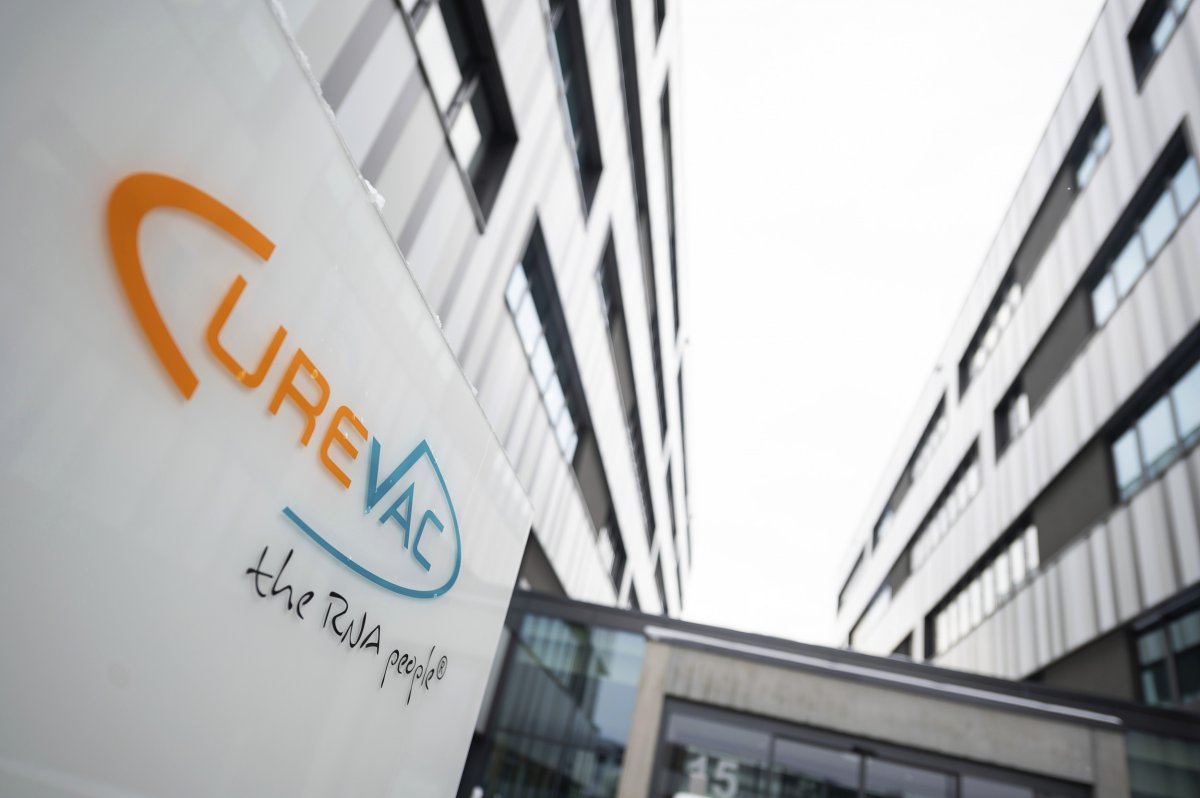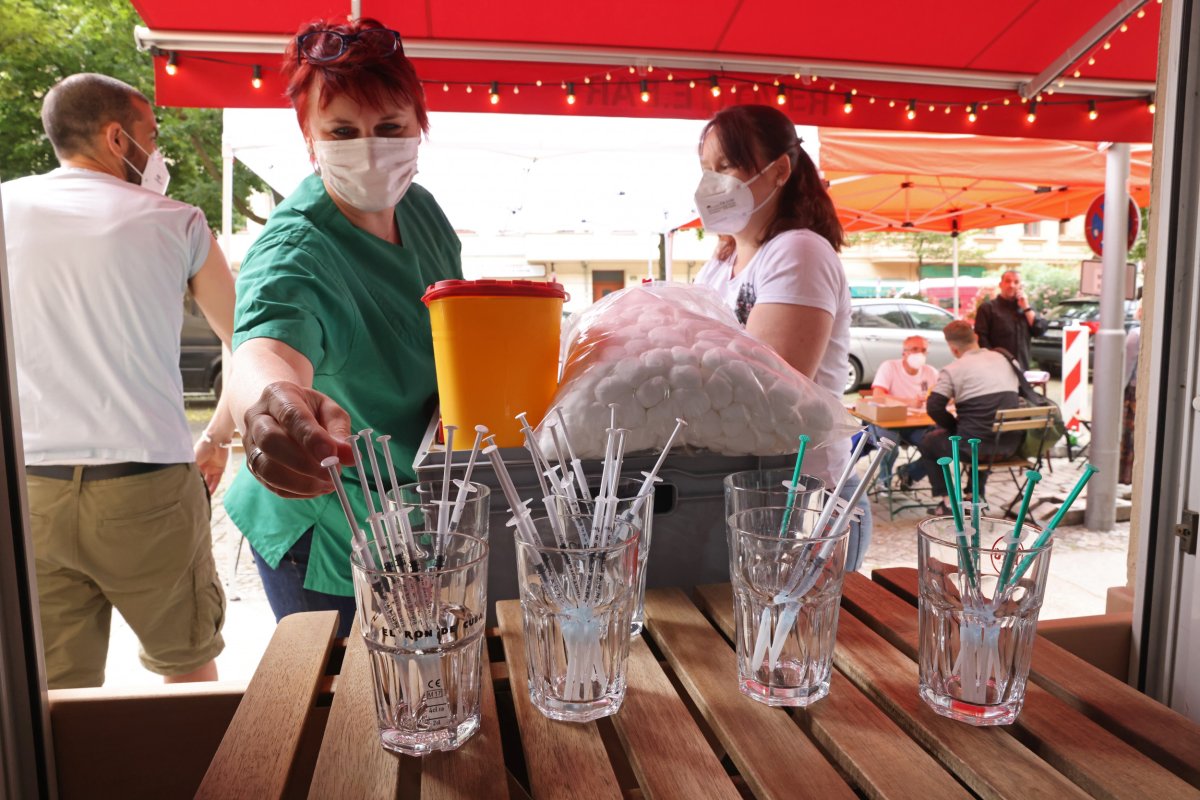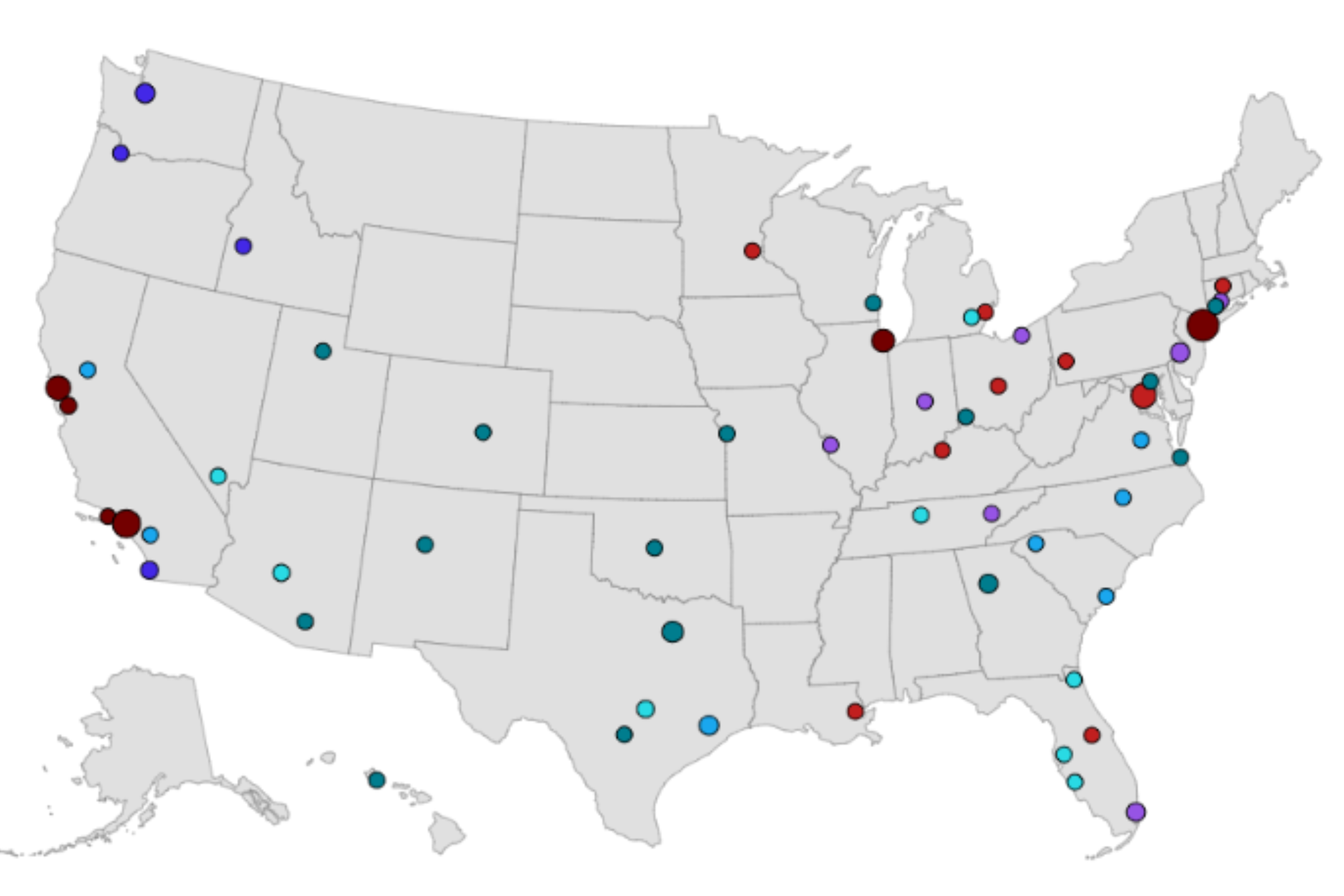German company CureVac announced its COVID-19 vaccine was only shown to be effective against 47 percent of cases in a partial review of trial data that involved 40,000 participants, a percentage which is 3 percent below the World Health Organization's (WHO) threshold.
The trial involved 40,000 participants in Latin America and Europe, and the company said more than two dozen variants of the virus were found, which may have affected the results of the trial.
"The results are sobering," said CureVac CEO Franz-Werner Haas. "We recognize that demonstrating high efficacy in this unprecedented broad diversity of variance is quite challenging."
Despite the current results, the company is aiming to finish its final analysis before determining if it will seek regulatory approval from WHO.
For more reporting from the Associated Press, see below.

Japan's top government spokesman says the country plans to start issuing vaccine passports around mid-July when more international trips are expected to open up to those who have received COVID-19 vaccines.
Chief Cabinet Secretary Katsunobu Kato says the government will start issuing vaccination certificates for those traveling overseas to be exempt from quarantine requirements or to shorten quarantine period.
The vaccination certificates will be issued by paper, but the government is considering issuance in digital format as well, Kato said.
Business communities in Japan have been calling for issuance of vaccine passports to help smooth their business trips when economic activities eventually resume. But the certificates also raise concerns about privacy, security and fairness. Critics say the passports will only benefit people and countries with more access to vaccines.
Japan has lagged many advanced nations in vaccination rollouts. Prime Minister Yoshihide Suga, who is determined to hold the Olympics despite the pandemic, is pushing to accelerate the process. About 6% of Japanese have been fully vaccinated.
___
Nepal's health minister says the country has significantly reduced coronavirus infections after its worst outbreak but is in desperate need of vaccines.
Health Minister Sher Bahadur Tamang said in an interview with The Associated Press that "The main issue for us is vaccines, and unless we get vaccines we cannot say everyone is safe."
Only about 8.5 percent of the population has received one shot and about 2.5 percent have been fully immunized.
Nepal launched a vaccination campaign in January but was forced to suspend it after India halted exports of domestically produced vaccines because of its own outbreak. COVAX, the U.N.-backed project to supply vaccines to poor regions of the world, pledged Nepal 2 million doses by March. But it only provided 248,000 because it's facing a serious shortage.
Nepal has been under lockdown since April after cases and deaths spiked following a massive outbreak in neighboring India. Close to 10,000 new cases and hundreds of deaths were reported daily in mid-May. There was an acute shortage of hospital beds, medicines and oxygen for patients.
The improved number of new cases on Thursday was 2,607, along with 39 deaths, according to the Health Ministry.
___
The Wisconsin Department of Health Services is tracking a new variant of the coronavirus, citing more than two dozen cases in the state.
The delta strain has been elevated to a "variant of concern" in Wisconsin. The strain is fueling the coronavirus surge in the United Kingdom and, according to the Centers for Disease Control and Prevention, is more contagious.
DHA says the vaccines currently available in the U.S. have been shown to provide some protection against the delta strain, the State Journal reported.
DHS Secretary-designee Karen Timberlake says, "The sooner people get vaccinated against COVID-19, the less opportunity for the virus to keep mutating."
Since April, Wisconsin has identified 26 cases of the delta variant. Health officials say the state will begin reporting case counts of the delta strain. The department is also tracking five other variants of concern in the state.
___
Japan has announced the easing of a coronavirus state of emergency in Tokyo and six other areas next week, ahead of the Tokyo Olympics in just over a month.
Japan has been struggling since late March to slow a wave of infections propelled by more contagious variants, with new daily cases soaring above 7,000 at one point and seriously ill patients straining hospitals in Tokyo, Osaka and other metropolitan areas.
Daily cases have since subsided significantly. In Tokyo, new cases are down to 500 per day from about 1,100 in mid-May. That paved the way for Prime Minister Yoshihide Suga to downgrade the state of emergency when it expires on Sunday to less stringent measures. Suga says the relaxed measures will focus on early closures of bars and restaurants. Those measures will last until July 11. The Olympics are scheduled for July 23-Aug. 8.
If another surge occurs and strains hospitals, the prime minister says, "we will quickly take action, including strengthening of the measures."
As of Wednesday, only 6 percent of Japanese were fully vaccinated.
___
The World Health Organization's Africa director says Tanzania has asked to join the global COVAX facility that ensures vaccine access for low-income countries.
Dr. Matshidiso Moeti says the East African nation has formally written to express its "willingness" to join the United Nations-backed project.
Tanzania is being monitored by public health officials. Tanzania, Burundi and Eritrea are the only African countries that haven't started vaccinations, according to the Africa Centers for Disease Control and Prevention.
The now-deceased former president of Tanzania, John Magufuli, was widely criticized abroad for minimizing the threat from the coronavirus and warning against the use of vaccines. Magufuli died in March.
Tanzania's new leader, Samia Suluhu Hassan, appears to be taking a more scientific approach to combat the COVID-19 pandemic. She said in April she was forming a technical committee to advise about the scope of coronavirus infections in the country and how to respond to the pandemic.
___
The Danish Health Authority recommends giving children ages 12 to 15 a COVID-19 vaccine, with the agency's head Soeren Brostroem saying Denmark needs more immunity.
"It looks right now like we have a 75 percent immunity," Brostroem said. "It is not sufficient. By choosing to vaccinate the 12- to 15-year-olds, it can provide an additional 4 percent immunity. We need that."
Almost half of Denmark's population of 6 million have received the first shot and nearly 30 percent have gotten the second dose of either Pfizer or Moderna shots, he said.
In May, the European Medicines Agency authorized children in that age group to be vaccinated with COVID-19 vaccines.
___
The Philippine president has agreed to ease a pandemic regulation requiring people to wear face shields on top of masks in most public areas, but health officials said they would appeal the decision as COVID-19 cases remain high in many areas.
The Philippines has made the wearing of plastic face covers mandatory since December in most public areas outside of home, including in shopping malls, transport terminals and places of worship, as an additional infection safeguard.
But compliance has been spotty and opponents have doubted its necessity and say the plastic shields dangerously obscure vision when they become moist.
Senate President Vicente Sotto III said President Rodrigo Duterte agreed to require face shields only in hospitals and allowed him and other senators to remove their face shields during a Wednesday night meeting.
Health Secretary Francisco Duque III said he would appeal. An inter-agency body dealing with the pandemic is tasked with making an assessment and informing the president of its position.
An alarming surge in coronavirus infections has started to ease in Manila and outlying regions. Daily cases remain high and lockdowns have been re-imposed in several provinces that have reported case spikes.
___
Indonesia's president has ordered authorities to speed up the country's vaccination campaign as the World Health Organization warned of the need to increase social restrictions amid a surge of coronavirus cases in the country.
"We need vaccination acceleration in order to achieve communal immunity, which we hope can stop the COVID-19 spread," President Joko Widodo said Thursday while visiting a vaccination center just outside the capital, Jakarta.
Widodo said he ordered his Cabinet ministers and local governments to increase the number of people vaccinated each day to 1 million by next month. He said Indonesia is currently vaccinating half a million people a day.
Indonesia, the world's fourth most populous country, aims to inoculate more than 181 million of its 270 million people by March 2022. So far, 11.8 million people have been fully vaccinated and another 9.6 million others are partially vaccinated.
Indonesia had its number of confirmed new cases climb to nearly 10,000 a day on Wednesday, an increase blamed on travel during last month's Eid al-Fitr holiday as well as new virus variants.
___
Singer-songwriter Peter Gabriel says a music and arts festival he co-founded in England may have to be cancelled without support from the British government.
The four-day Womad festival, which showcases international music, arts and dance, is scheduled to start near the town of Malmesbury on July 22, just three days after the new date when lockdown restrictions in England are set to be lifted.
Though the government has expressed confidence that all remaining restrictions on social contact will be lifted on July 19, Womad organizers are clearly concerned about their financial exposure.
Gabriel told BBC radio that the government should introduce "something like an insurance scheme, some sort of underwriting scheme."
He said organizers would likely have to cancel if support is not forthcoming, not least because the festival has faced bankruptcy twice before.
___
Austria plans to remove capacity limits on cultural and sports events, reopen clubs and drop restrictions on weddings and parties from July 1.
Chancellor Sebastian Kurz says a requirement for people attending events to prove that they have been vaccinated, tested or have recovered from COVID-19 will remain in place, but they won't have to wear masks.
Kurz says mask requirements elsewhere will be relaxed. From the beginning of next month, people will no longer be required to wear full protective masks in shops, museums and public transport -- simple face coverings will be allowed. He said more measures will be relaxed on July 22.
The country recorded 15.5 new cases per 100,000 inhabitants in the past week. So far, 4.28 million people in the nation of some 8.9 million people have received at least one vaccine dose and 2.23 million have been fully vaccinated.
___
Australia has raised the age for which the AstraZeneca vaccine is recommended to 60 from 50 after the shot was blamed for a 52-year-old woman's death last week from blood clots in the brain.
Health Minister Greg Hunt described the decision on Thursday as conservative and reflecting the relatively low risk of contracting the virus in Australia.
Australians ages 50-59 are recommended to use Pfizer, the only other vaccine approved in Australia.
Only two deaths in Australia have been blamed on rare blood clots believed caused by AstraZeneca. The first was a 48-year-old woman who died in April. That death led to AstraZeneca being recommended only to adults over 50.
___
New Zealand has detailed plans for the main part of its vaccine rollout.
The country of 5 million has been among the most successful in keeping out the virus but has been slow to vaccinate its people, with just 11 percent receiving their first dose so far.
Under the plan announced Thursday by Prime Minister Jacinda Ardern, people age 60 and over will be offered vaccines from July 28, those 55 and over from Aug. 11, and those age 45 and over by late August. After that, the plan is to offer everybody vaccinations by the year's end.
Also on Thursday, Statistics New Zealand reported the economy had grown by 1.6 percent in the March quarter, allowing the country to avoid a double-dip coronavirus recession after the economy fell by 1 percent in the last quarter of 2020. Annual GDP fell by 2.3 percent.

Uncommon Knowledge
Newsweek is committed to challenging conventional wisdom and finding connections in the search for common ground.
Newsweek is committed to challenging conventional wisdom and finding connections in the search for common ground.
About the writer
To read how Newsweek uses AI as a newsroom tool, Click here.








